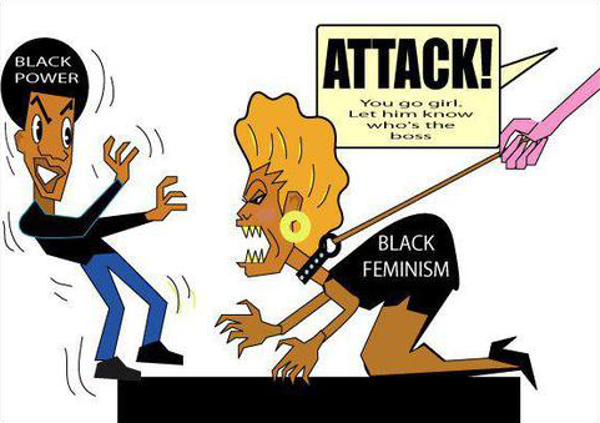NEW YORK CITY, USA – An African American lecturer, Kimberlé Williams Crenshaw, has heaped her feminist attacks on President Obama’s signature initiative on race — My Brother’s Keeper, a five-year $200 million program that will give mentorships, summer jobs and other support to boys and young men of color, most of them African-American or Hispanic.
She claims that President Obama has entirely omitted the challenges facing mothers and sisters of color. She indicts Mr Obama for a perfunctory shout-out he gave to “all the heroic single moms out there,” at a meeting in Washington last week to announce new commitments to My Brother’s Keeper from corporations, school systems and nonprofits, but completely ignored girls since he did not utter the word “girls” even once.
How can a Black woman be against giving disadvantaged Black boys and young Black men greater opportunities for success? I suppose if we can’t help everyone with one panacea, why bother trying?
Ms Kimberlé Williams Crenshaw feels that though Mr. Obama’s focus is on “men of color – with stories of his Kenyan father he knew for a month and the Kansan mother who went on to raise him – speaks volumes about his passion for women,” My Brother’s Keeper on the other hand “highlights one of the most significant contradictions of his efforts to remain a friend to women while navigating the tricky terrain of race.”
Ms Kimberlé Williams Crenshaw went on to surmise that Mr Obama’s actions in fact amounted to an “abandonment of women of color, who have been among his most loyal supporters.”
Her emotions run even deeper when she pointed to My Brother’s Keeper as a consequent erasure of issues affecting females of color and that the problem is regarded as neither politically nor morally significant.
Gender exclusivity isn’t new, but it hasn’t been so starkly articulated as public policy in generations. It arises from the common belief that black men are exceptionally endangered by racism, occupying the bottom of every metric: especially school performance, work force participation and involvement with the criminal justice system. Black women are better off, the argument goes, and are thus less in need of targeted efforts to improve their lives. The White House is not the author of this myth, but is now its most influential promoter.
However, Ms Kimberlé carefully sidesteps the biggest problem facing black girls today. They grow up, get a degree or two, the well paying job, and there are no eligible black men for them to get married to and have families with. What President Obama is doing helps Black boys as well as Black girls.
But the ignorance of Ms Kimberlé Williams Crenshaw’s assertions and her liberal allies can be truly astounding. Mentoring young black men towards becoming responsible adults could be of the greatest constructive changes that could ever happen to Black women, their families and their communties.
A Black man who nurtures his wife to become that which she believes she could be and vice versa could be an immense contribution towards turning back the hand of time on black urban blight. A positive change can never happen without the first huge step – letting a young man learn that he can grow to be a real man and share in the nurturing responsibility of the community.
What would Ms Kimberlé know about being a real man? She stepped up her assertions even further with more controversially alarming data.
It is often shuddering how this Sociologist interprets Statistics. She argues she is against any evidence supporting claims that Black men suffer more abuse at the hands of police, and calls them, “often illogical, selective or just plain wrong”.
When in February, Mr. Obama announced the initiative — which is principally financed by philanthropic foundations, and did not require federal appropriations — he noted that boys who grew up without a father were more likely to be poor.
Ms Kimberlé Williams Crenshaw wrote that she preferred the more emphatic question, “more likely than whom?” She claims it could certainly not be “their sisters, who are growing up in the same households, attending the same underfunded schools and living in the same neighborhoods.”
Black girls, she continued, “have the highest levels of school suspension of any girls. They also face gender-specific risks: They are more likely than other girls to be victims of domestic violence and sex trafficking, more likely to be involved in the child welfare and juvenile justice systems, and more likely to die violently. The disparities among girls of different races are sometimes even greater than among boys.”
Ms Kimberlé Williams Crenshaw went on to mock proponents of My Brother’s Keeper — and similar programs, like the Young Men’s Initiative, begun by Michael R. Bloomberg in 2011 when he was mayor of New York — that point to the mass incarceration of black men to explain their focus on men.
She asks, is it “their point that females of color pull even with males in a race to the bottom before they deserve interventions on their behalf?”
In the White House defense, they point to the Council on Women and Girls, the Lilly Ledbetter pay equity law and efforts to increase participation of girls in science, technology, engineering and math — “it’s not either/or,” says Valerie Jarrett, one of Mr. Obama’s closest advisers.
However, Ms Kimberlé feels that those efforts aren’t remotely comparable to a now $300 million public-private initiative focused on boys.
She cherry-picks her data. She dishonestly refuses to look at the data showing that between boys and girls, boys are disadvantaged. This is especially stark between black boys and black girls.
Since Ms. Crenshaw won’t give the data, a look at this report from Pew Research reveals more than a mouthful.
Just between 1994 and 2012, black boys enrollment in college in the fall following high school did not budge, while black girls enrollment increased nearly 20%. Black girls are getting college degrees while black boys are being sent to prison.
There is some evidence to indicate this results from single mothers, overall, who are not competent at raising boys (or, even worse, not really liking their sons as much as their daughters). A cursory look at this study from MIT shows this.
There are special programs for girls of color through Girls, Inc. and YWCAs, with nothing equivalent for boys, who are left to be raised by the streets. The White House refused to establish a Council for Black boys and men.
Ms. Crenshaw’s unsupported opinions amount to nothing less than blatant, sexist discrimination against Black boys. She seeks to include girls in all programs to help boys, while continuing the systematic exclusion of boys from the multiple, well-funded programs that already exist to help girls and girls only.
Professor Crenshaw hates Black boys.
She feels that supporters of My Brother’s Keeper use the analogy of “the canary in the coal mine” to justify both a narrow focus on individual-level interventions — as opposed to systemic policies to narrow the persistent racial gaps in education, income and wealth — and the exclusion of women and girls. She claims that the argument goes that “Black boys are the miner’s canary, and so efforts to save them will trickle down to everyone else.”
But the point of the canary’s distress Ms Kimberlé argues was to alert everyone to get out of the mine, not to attend to the canary and ignore the miners. “Implicit in rescuing only the males is the idea that the mine itself isn’t the problem — and that females are resilient enough to survive the toxic air or can hold their breath and wait. What needs to be fixed are not boys per se, but the conditions in which marginalized communities of color must live.”
Despite what seems a conscious attempt on Ms Kimberlé’s part to hide the fact that young black men are currently facing a crisis and for reasons that are somewhat specific to them, perhaps in the same way that young black women disproportionately face the problems of teenage pregnancy, young black men disproportionately face a risk of incarceration.
There is no need to argue that programs that focus on discouraging teenage pregnancy, or providing support for young single mothers, or any of the other attempts to reduce problems that disproportionately affect poor women, occur at the expense of poor men.
But is there a need to green-eye shade balance one over another? Ms Kimberlé’s arguments and seeming hatred even for Black men and boys, seems singularly and particulaly petty. Black boys are in a crisis, and it seems small to deprive them of the help that might ameliorate their problems, just as it would be small to deprive girls of help for the situations that most affect them.
But here is a more biting imperative: “Kimberlé Williams Crenshaw is a professor of law at Columbia University and the University of California, Los Angeles, and the executive director of the African American Policy Forum.
Where’s Prof. Crenshaw’s program for girls?
This question needs to be posed to the black feminist that Kimberlé Williams Crenshaw is. She shouldn’t forget that helping our community takes everyone, not just the superman that she feels Mr Obama is – whom she insults or teach a lesson to, at whim, in public.
Hopefully the next time Ms. Crenshaw sits down to pen her disgust for Black men and boys she must equally tell us what she is doing for Black girls, if she loves them at all.
Perhaps she has a similar organization, like My Brother’s Keeper, out there in need of the donations Mr Obama is receiving. Certainly not! She hasn’t even tried. But she finds time to complain about what President Obama isn’t doing instead of advising on what can be done to help black girls too.
It is really sickening – the constant victim mentality of the highly educated liberal Black woman. No one is forgetting black girls Ms. Crenshaw. Many Black men work with Black youth, boys and girls. Only we have yet to see much of Black academia make it down from their Ivory Towers to participate in their own backyard communities where Black men and women are busy trying to make the best for their “kids in the hood”.










